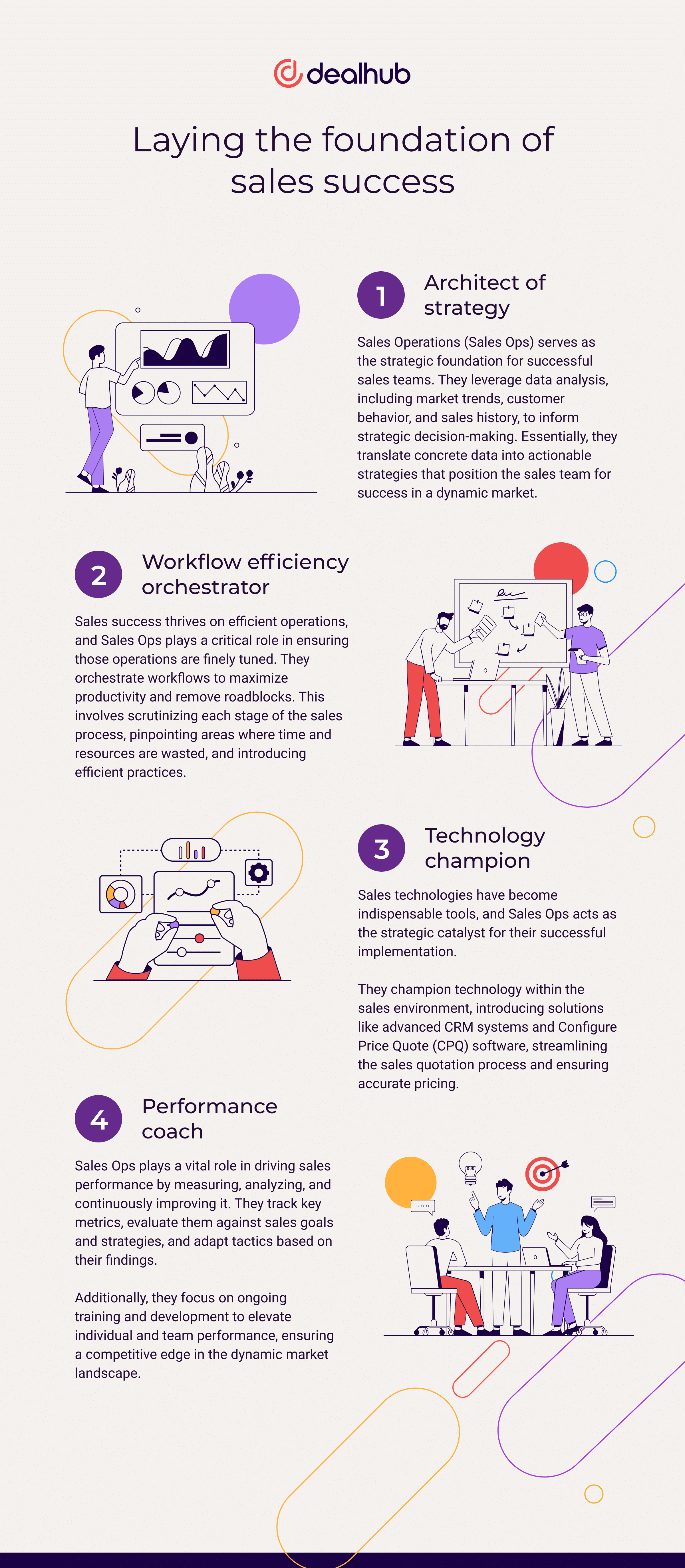Sales Ops teams focus on bringing together smart planning, the right technology, and effective teamwork to make sales teams more successful. They go beyond helping with administrative tasks and transform how a sales team works. With Sales Ops, teams are not just trying to meet their goals; they are equipped to surpass them. They are game-changers in any organization, turning a good sales team into a great one by ensuring everyone works together efficiently and has the tools they need to succeed.
Laying the foundation of sales success
In sales, success rests on four fundamental cornerstones: strategy, operations, technology, and performance. Each plays a vital role in building a robust sales infrastructure that aligns with overall business objectives. Tasked with building a solid foundation, Sales Ops is the unsung hero behind every high-performing sales team.

Architect of strategy
Sales Operations (Sales Ops) serves as the strategic foundation for successful sales teams. They leverage data analysis, including market trends, customer behavior, and sales history, to inform strategic decision-making. By identifying emerging trends and combining this insight with historical sales data, Sales Ops can guide the team to adapt to these evolving customer preferences. Essentially, they translate concrete data into actionable strategies that position the sales team for success in a dynamic market.
Furthermore, Sales Ops plays a critical role in crafting and implementing effective sales strategies. They establish clear sales goals and key performance indicators (KPIs) that directly align with the company’s vision and objectives. These defined goals and metrics ensure that every sales activity contributes meaningfully towards achieving specific business outcomes. By establishing this strategic alignment, Sales Ops streamlines efforts and bridges the gap between day-to-day sales activities and long-term business goals, ultimately driving the company’s overall growth and success.
Workflow efficiency orchestrator
Sales success thrives on efficient operations, and Sales Ops plays a critical role in ensuring those operations are finely tuned. By meticulously examining each step of the sales cycle, they identify areas for improvement and implement solutions to eliminate redundancies and streamline tasks. This translates directly into increased sales activity: quicker responses to opportunities, improved lead management, and faster deal closure. This laser focus on efficiency not only boosts sales productivity but also elevates the customer experience through smoother, more responsive interactions.
Thinking of Sales Ops as the conductor of the sales orchestra, it orchestrates workflows to maximize productivity and remove roadblocks. This involves scrutinizing each stage of the sales process, pinpointing areas where time and resources are wasted, and introducing efficient practices. For example, Sales Ops might implement a system that automatically assigns leads based on expertise and workload, ensuring a balanced distribution and faster response times. Additionally, they might introduce automation tools to free up sales reps from tedious data entry, allowing them to dedicate more time to engaging with clients. These optimized workflows ultimately enhance productivity and ensure a smoother, more efficient sales process for both the sales team and customers.
Technology champion
Sales technologies have become indispensable tools, and Sales Ops acts as the strategic catalyst for their successful implementation. Sales Ops champions technology within the sales environment, acting as the “tech guru” for the team. They introduce solutions like advanced CRM systems, ensuring organized and readily accessible customer information, leading to smoother client interactions. Furthermore, Sales Ops advocates the implementation of tools like Configure Price Quote (CPQ) software, streamlining the sales quotation process and ensuring accurate pricing.
Additionally, by leveraging automation solutions like DealHub, Sales Ops frees up the sales team from repetitive tasks like daily administration, allowing them to focus on more strategic activities. DealHub is a full quote-to-revenue solution that supports the conversion and retention stages of the customer lifecycle by streamlining quote creation, ensuring accurate quotes with real-time product pricing, and syncing data between CRM, CPQ, and Billing. This data flow is a major benefit to Sales and RevOps leaders who rely on accurate data for revenue forecasting and compliant revenue recognition.
These tools not only provide real-time insights and analytics for informed decision-making but also enhance the overall sales process, making it agile and responsive to both customer needs and market changes. As a result, Sales Ops strengthens the sales team’s capabilities through strategic technology management, leading to increased efficiency and improved results.
Performance coach
Sales Ops plays a vital role in driving sales performance by measuring, analyzing, and continuously improving it. This involves a closed-loop process where Sales Ops tracks key metrics, evaluates them against sales goals and strategies, and adapts tactics based on their findings. This continuous analysis ensures that sales strategies remain dynamic and responsive to market shifts and evolving customer needs, allowing the sales team to adapt quickly for optimal performance. By keeping a constant pulse on performance and market trends, Sales Ops empowers the sales team to navigate challenges and capitalize on emerging opportunities.
Beyond performance analysis, Sales Ops also serves as the sales team’s trusted coach, focusing on ongoing training and development to elevate individual and team performance. This includes organizing targeted training sessions on various topics, such as advanced sales techniques, effective use of sales tools, and lead conversion strategies. For instance, workshops may cover leveraging social media for lead generation or using data analytics to understand customer needs. These programs equip sales reps with the necessary knowledge and practical skills, allowing them to directly apply their learnings to their daily activities. By continuously providing these learning opportunities, Sales Ops helps the sales team stay ahead of changing industry trends and evolving customer expectations, securing a competitive edge in the dynamic market landscape.
The transformation into a revenue-generating powerhouse
Integrating the four cornerstones of sales success – strategy, operations, technology, and performance – has a transformative effect on sales teams, turning them into revenue-generating powerhouses. This integration creates a synergistic environment where each element reinforces the others, leading to exponential growth and scaling of the company.
When strategy, operations, technology, and performance work harmoniously, sales staff evolve beyond their traditional roles. They become more agile, informed, efficient, and capable of meeting and exceeding sales targets. A well-crafted strategy ensures that every effort is aligned with the business’s goals, operations streamline the sales process for maximum efficiency, technology provides the tools for effective selling, and continuous performance evaluation keeps the team on track and improving.
This transformation is not just theoretical. Numerous companies have leveraged effective sales operations to skyrocket their growth.
Consider the case of Lenovo, a global leader in the PC market. Their strategic approach to Sales Ops focuses on customer-centric strategies backed by efficient operations and cutting-edge technology. Lenovo’s use of predictive analytics to forecast market trends and customer preferences has been a game-changer. This approach, coupled with their emphasis on performance metrics, has driven their remarkable growth in the highly competitive tech industry.
Another example is IKEA, the renowned furniture retailer. IKEA’s sales operations strategy integrates efficient supply chain management, innovative technology in customer service (like AR in their app), and a strong performance culture. This synergy has enabled IKEA to remain a market leader, continually growing in global retail markets.
In both cases, Sales Operations teams played a primary role in transforming these companies into revenue-generating entities. By focusing on the four cornerstones, Sales Ops helped these businesses manage their sales funnels and enhance their overall market position and customer satisfaction.
Moreover, this transformation has a ripple effect across the entire company. As sales increase, businesses have more resources to invest in product development, marketing, and customer service, further fueling revenue growth. This creates a positive feedback loop, where success in sales drives overall business success, leading to scaling and expansion.
Setting the stage for growth
The transformation into a revenue-generating powerhouse is not an overnight process, but with the proper focus on these cornerstones, any sales team can make this leap. The key is continuously adapting and evolving, staying ahead of market trends and customer needs. With effective sales operations, companies can not only meet their current sales targets but also set the stage for sustainable growth and success in the future.
According to McKinsey, beyond sales enablement, successful sales operations also depend on aligning with buyer journeys, focusing on high-value activities, and fostering a culture of continuous improvement. These principles help in optimizing sales strategies and processes, further enabling frontline sales teams to become more dynamic and customer-focused.
For the win
Sales Ops is the backbone of a successful sales organization. It’s all about intelligent strategy, making your workday smoother, using the best tech tools, and always aiming to get better at what you do. Think of Sales Ops as a coach that leads a winning team, driving more sales and helping the company grow. If you’re a sales leader, pushing for a robust Sales Ops approach can take your entire team’s performance up a notch. It’s a smart move for any business looking to make a real impact in the market.









